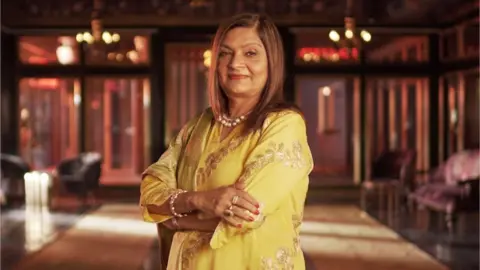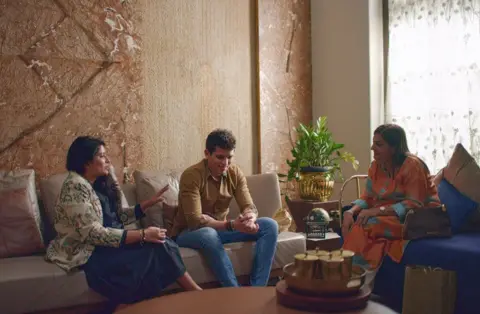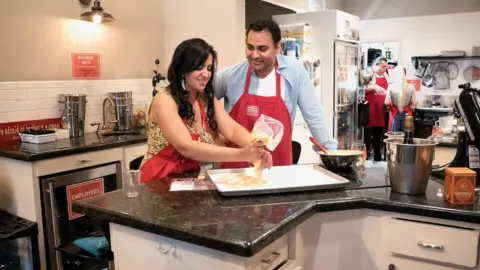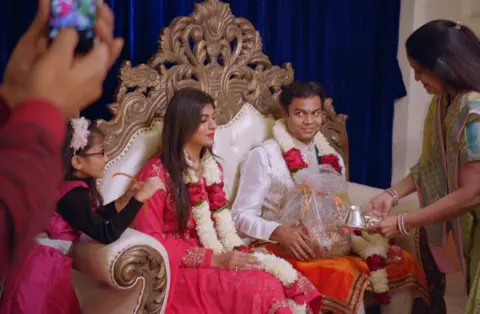Indian Matchmaking: The 'cringeworthy' Netflix show that is a huge hit
 Yash Ruparelia/Netflix
Yash Ruparelia/NetflixA new Netflix show, Indian Matchmaking, has created a huge buzz in India, but many can't seem to agree if it is regressive and cringeworthy or honest and realistic, writes the BBC's Geeta Pandey in Delhi.
The eight-part docuseries features elite Indian matchmaker Sima Taparia as she goes about trying to find suitable matches for her wealthy clients in India and the US.
"Matches are made in heaven and God has given me the job to make it successful on Earth," says Ms Taparia who claims to be "Mumbai's top matchmaker".
In the series, she's seen jet-setting around Delhi, Mumbai and several American cities, meeting prospective brides and grooms to find out what they are looking for in a life partner.
Since its release nearly two weeks back, Indian Matchmaking has raced to the top of the charts for Netflix in India.
It has also become a massive social phenomenon. Hundreds of memes and jokes have been shared on social media: some say they are loving it, some say they are hating it, some say they are "hate-watching" it, but it seems almost everyone is watching it.
The in-your-face misogyny, casteism and colourism on display have caused much outrage, but also inspired many to introspection.
Ms Taparia, who's in her 50s and like a genial "aunty" to her clients, takes us through living rooms that resemble lobbies of posh hotels and custom-made closets filled with dozens of shoes and hundreds of items of clothing.
"I speak to the girl or the boy and assess their nature," she says, using girls and boys to describe unmarried women and men like most Indians. "I visit their homes to see their lifestyle, I ask them for their criteria and preferences."
 Netflix
NetflixThat, though, is mostly with her Indian-American clients - where men and women in their 30s have tried Tinder, Bumble and other dating apps and want to give traditional matchmaking a chance to see if it helps them find love.
The conversations back home in most cases happen with the parents because, as Ms Taparia says, "in India, marriages are between two families, and the families have their reputations and millions of dollars at stake so parents guide their children".
As we progress through the episodes, it's obvious it's much more than just guidance.
It's the parents, mostly mothers of young men, who are in charge, insisting on a "tall and fair bride" from a "good family" and their own caste.
Ms Taparia then leafs through her database to pull out a "biodata" that would make a good fit.
Arranged marriages are commonplace in India and even though instances of couples marrying for love are growing, especially in urban areas, 90% of all marriages in the country are still arranged.
Traditionally, matchmaking has been the job of family priests, relatives and neighbourhood aunties. Parents also trawl through matrimonial columns in newspapers to find a suitable match for their children.
Over the years, thousands of professional matchmakers and hundreds of matrimonial websites have joined the hunt.
But what has come as a surprise to many here is that affluent, successful, independent Indian-Americans are also willing to try "methods from the past" and rely on the wisdom of someone like "Sima aunty" to find them a match. Many of them also come with long shopping lists that include caste and religious preferences.
"As an educated, liberal, middle-class Indian woman who does not view marriage as an essential part of life, I watched Indian Matchmaking like an outsider looking in on an alien world," journalist and film critic Anna MM Vetticad told the BBC.
Arranged marriages, she says, are "a practical Indian version of the dating game in the West and to that extent this show can be educational since it does not condescendingly suggest that one is a more modern practice than the other."
Ms Vetticad describes Indian Matchmaking as "occasionally insightful" and says "parts of it are hilarious because Ms Taparia's clients are such characters and she herself is so unaware of her own regressive mindset".
But an absence of caveats, she says, makes it "problematic".
 Netflix
NetflixIn the show, Ms Taparia is seen describing marriage as a familial obligation, insisting that "parents know best and must guide their children". She consults astrologers and even a face reader over whether a match would be auspicious or not, and calls her clients - mostly independent women - "stubborn", telling them to "compromise" or "be flexible" or "adjust" if they are to find a mate.
She also regularly comments on their appearance, including one instance where she describes a woman as "not photogenic".
No wonder, then, that critics have called her out on social media for promoting sexism, and memes and jokes have been shared about "Sima aunty" and her "picky" clients.
Some have also criticised the show for glossing over how the process of arranged marriages has scarred many women permanently.
One woman described on Twitter how she felt like chattel being paraded before prospective grooms and the show brought back painful memories.
"The whole process of bride viewing is so demeaning for a woman because she's being put on display, she's being sized up," Kiran Lamba Jha, assistant professor of sociology at Kanpur's CSJM university, told the BBC.
"And it's really traumatic for her when she is rejected, sometimes for trivial reasons like skin colour or height," Prof Lamba Jha added.
 Netflix
NetflixOn the show, one Indian mother tells Ms Taparia that she has been receiving lots of proposals for her son but had rejected them all because either the girl was "not well educated" or because of her "height".
And an affluent bride-seeking man reveals he has rejected 150 women.
The show does not question these prejudices but, as some point out, what it does do is hold up a mirror - a disturbing reminder of patriarchy and misogyny, casteism and colourism.
And, as writer Devaiah Bopanna points out in an Instagram post, that is where its true merit lies.
"Is the show problematic? Reality is problematic. And this is a freaking reality show," he writes.
"Reality is not 1.3 billion woke people worried about clean energy and free speech. In fact, I would have been offended if Sima Aunty was woke and spoke about choice, body positivity and clean energy during matchmaking. Because that is not true and it is not real."